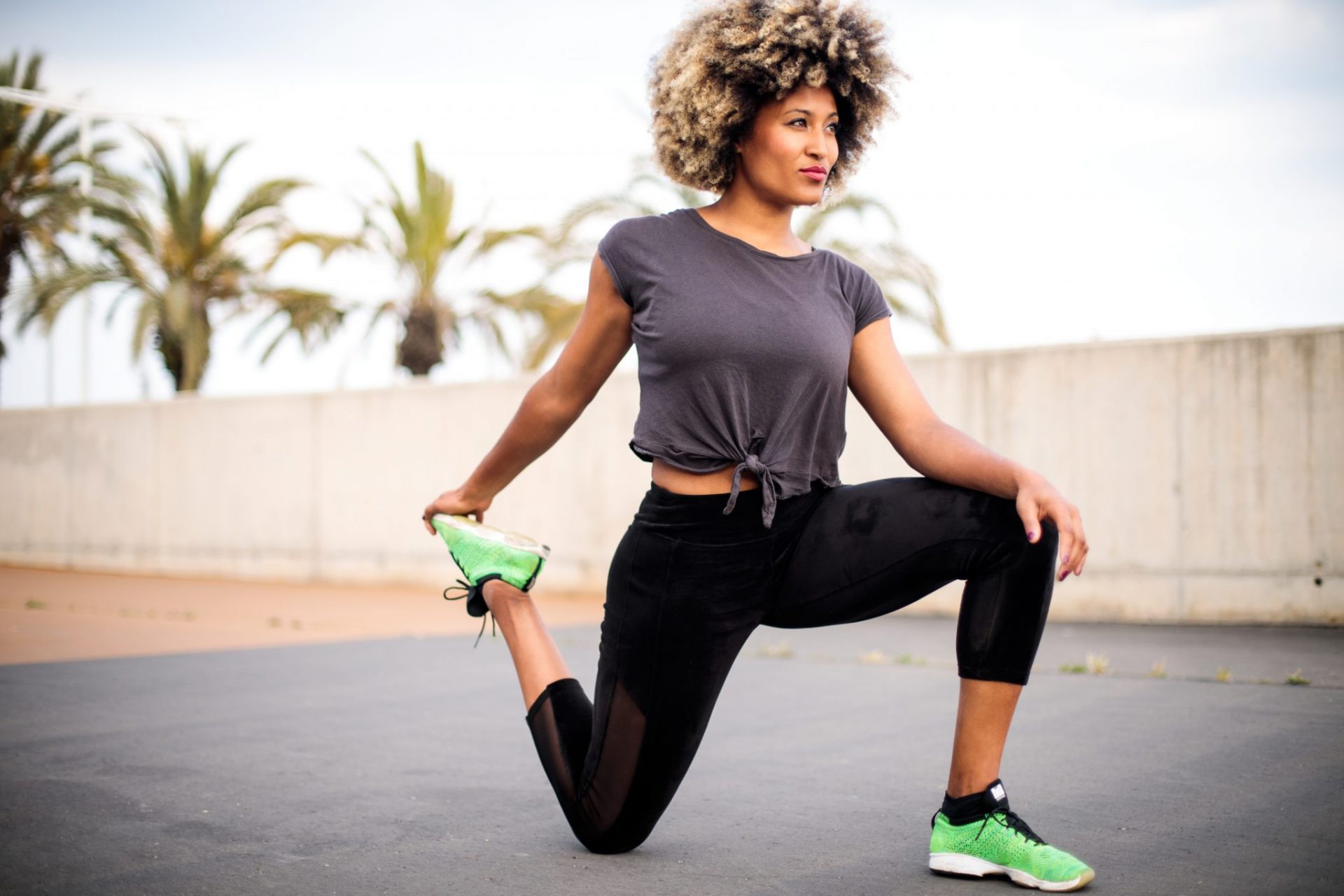Most of us deal with tight hips – especially when we’re sat down all day. Here are 4 of the best stretches to release that tension.
Stiff and sore muscles are annoying, but when it’s your hips that feel achey it’s almost unbearable. That’s because you can’t get away from it, with sore hips making any movement, from walking to lifting, pretty painful.
While muscle pain can come from training, stiff hips are also caused by inactivity – especially when most of us are still working from home and sitting for long periods. Feel like your joints creak a bit every time you get up from the sofa? That’ll probably be from tight hips.
What we refer to as the ‘hips’ are actually lots of different muscles, joints and bones. A ball and socket joint that attaches the femur (or the thigh bone) to the pelvis is what we usually talk about when discussing the hips, but your glutes, abductors (the muscle on the outside of the hip) and adductors (the inner thigh muscle) also come into it too. Then there’s your hip flexor: it’s this muscle that can cause the tight pain down the top, front of your legs that we often associate with sore hips.
You may also like
DOMS: Everything you need to know about Delayed-Onset Muscle Soreness
“Hip flexors are not only responsible for moving your legs around, but they also belong to your ‘core’ muscles that stabilise your hips and spine,” explains Ruth Woodside, personal trainer, strength and movement coach and founder of calisthenics studio MOVE Hackney.
Why do our hips get tight?
This is a big question. There are so many reasons why our muscles and joints might be tight, from arthritis to an injury, but the most likely cause when it comes to hips is the amount of time we spend sat down, says Ruth. “This leads to shortening of the hip flexors – which often goes hand in hand with weak glute muscles, leading to postural problems, low back issues and knee pain.”
Women in particular can find that they get sore hips, and they may find that inflammation in the pelvis or reproductive organs during their menstrual cycle impacts the joint and muscles.

Another reason for soreness might be stress, as there is a school of thought that says we hold a lot of “negative emotional energy in our hips,” says Ruth. “My personal understanding is, as humans, we hold tension everywhere in our bodies when we are stressed – whether it’s physical or emotional. When our muscles are tensed for long periods of time, your body responds with pain to tell you to stop. If we already have an imbalance in the hip area, we may feel pain there.”
Should you stretch tight hips?
As short hip flexors can lead to pain, stretching them out is important in order to release tension. “But it is equally important to strengthen those muscles too,” says Ruth. “Stretching without strengthening can lead to further imbalances and injuries.”
It’s not just about stretching the hips – releasing tension from surrounding muscles can also reduce tightness in your hip flexors. “Sometimes we lock up through the front because the hamstrings at the back are tight – especially after a big leg day that includes RDLs and hamstring curls. Some simple hamstring stretches can really help,” adds Ruth. “With any mobility work, I would recommend doing it every day. It doesn’t have to be hour long sessions, a little each day makes a lot of difference.”
You may also like
Yoga: 5 fundamental yoga stretches for a full-body, holistic practice
She suggests starting to mobilise and strengthen the muscles and joints by holding a few minutes in a resting squat, allowing the psoas (or primary hip flexor) to relax fully. “Some good strengthening drills I like are dead bugs, hip bridges, leg raises and squat variations. I mean who doesn’t love squats?” she says.
The best hip flexor stretches
Finally, we can get to the stretching. Ruth suggests doing “maintenance stretches” – designed to return the muscle back to their pre-exercise length. These include:
Kneeling lunge
- Come into a low lunge with your back knee resting on to the floor and front leg bent at 90 degrees.
- Keeping your pelvis tucked so you don’t arch through the spine, push the hips forwards.
- Make sure the hips are in line and feel the stretch through the hip flexor of your back leg.
Kneeling quad stretch
- From your kneeling lunge position, bend your knee to bring your heel to your glute.
- Grab hold of your ankle with your arm on the same side to stabilise the leg and pull it further.
- Squeeze your glute muscles to enhance the stretch in the front of the leg.

Hamstring stretches
- Stand tall with your feet at shoulder with apart and your chest open.
- Hinge at the hips to drop your chest forwards into a forward fold.
- Grab the back of your calves and use your hands to pull your head towards your shins.
Pigeon pose
- Begin in a low lunge position with your back knee and both hands on the floor.
- Bring your front foot towards your opposite hand and drop your leg onto the floor so your shin is parallel with the top of your mat.
- Bring your chest down towards the floor, over your front leg, to extend the stretch.
Follow @StrongWomenUK on Instagram for the latest workouts, delicious recipes and motivation from your favourite fitness experts.
Images: Getty
Source: Read Full Article
